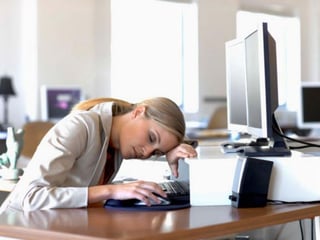
If you find yourself constantly on the verge of falling asleep at work just after lunch, there's no need to worry. It's mostly a result of your body's natural rhythm, although other factors can impact your energy levels. Despite drinking coffee or soda for caffeine for a boost of energy, most people still experience a lull in the early afternoon. Why is that?
Why You Feel Like Sleeping After Lunch
According to Lona Sandon, RD, MEd, a spokeswoman for the American Dietetic Association, "There seems to be a natural rhythm or set clock in our bodies, so many people tend to feel a little sleepy around 2 or 3 in the afternoon."
This natural occurance is referred to as circadian rhythm, which functions as a biological clock and tells our bodies when to sleep, rise, and eat. It dips and rises at different times of the day, but usually in the early afternoon.
But it's when this cycle collides with another physiological process known as sleep-wake homeostasis that really makes you want to fall asleep. This process measures the amount of time you've been awake and pushes you towards rest. According to How Sleep Works:
[Sleep-wake homeostasis] is quite intuitive in its operation: the longer we have been awake, the stronger the desire and need to sleep becomes, and the greater the likelihood of falling asleep; the longer we have been asleep, the more the pressure to sleep dissipates, and the greater the likelihood of awakening.
Add poor sleeping and eating habits to all of that, and you'll be met with an overwhelming desire for sleep. So how can you fight it?
4 Tips To Combat Post-Lunch Drowsiness
1. Exercise
By now it's common knowledge that having a regular workout routine increases your overall energy. Physical activity improves blood flow and provides oxygen and nutrients to muscle tissue, all of which help keep you going. If you're unable to get a workout in early in the morning, get up from your desk during lunch and go for a brisk walk or climb a few sets of stairs in your building. Anything to get the blood flowing.
2. Drink More Water
One sure-fire way to improve your energy (and overall health) is to drink plenty of water. Dehydration will surely keep your energy levels low, so be sure to sip on water all throughout the day. Plus, getting up from your desk every so often will keep that blood flowing. It's a good way to kill two birds with one stone.
3. Eat Healthier
Stay away from refined foods as much as possible. Items like white bread and buns might give you an initial boost of energy, but they break down fast and will leave you feeling sluggish. High-energy foods include lean meat, fish, and eggs. Foods high in iron such as kale or spinach may also help decrease fatigue.
4. Sleep Better
One way to throw your circadian rhythm off track (and increase the intensity of the post-lunch dip) is by not sleeping enough. People need an average of seven to eight hours of sleep each night. Be sure you're hitting that mark at least most of the time, otherwise you'll find yourself falling asleep at your desk.
Frequently Asked Questions About Post-Lunch Drowsiness
Why do I feel tired after lunch?
Feeling tired after lunch is mainly due to your body's natural circadian rhythm, which causes a dip in energy in the early afternoon. This effect is compounded by sleep-wake homeostasis, which increases your desire to sleep the longer you have been awake.
What is circadian rhythm and how does it affect my energy?
Circadian rhythm is a biological clock that regulates when your body feels awake or sleepy throughout the day. It typically causes a natural drop in alertness around 2 or 3 in the afternoon, leading to feelings of drowsiness.
How does sleep-wake homeostasis contribute to post-lunch sleepiness?
Sleep-wake homeostasis tracks how long you have been awake and increases your need for rest the longer you stay awake. This process makes you more likely to feel sleepy after being awake for many hours, such as after lunch.
Can poor sleeping and eating habits worsen afternoon tiredness?
Yes, inadequate sleep and unhealthy eating habits can intensify post-lunch drowsiness by disrupting your natural rhythms and reducing your overall energy levels.
What are some effective ways to combat feeling sleepy after lunch?
To fight post-lunch drowsiness, you can exercise during lunch breaks, drink plenty of water, eat healthier foods like lean meats and leafy greens, and ensure you get seven to eight hours of sleep each night.
Why is drinking water important for maintaining energy after lunch?
Staying hydrated helps maintain your energy levels because dehydration can cause fatigue. Drinking water throughout the day also encourages you to get up and move, which improves blood flow and alertness.
How does getting enough sleep affect my afternoon energy levels?
Getting seven to eight hours of sleep each night helps regulate your circadian rhythm and reduces the intensity of the post-lunch energy dip, making it easier to stay alert during the afternoon.

